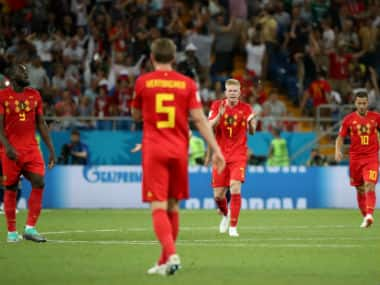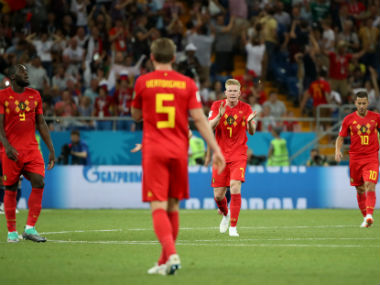The writing seemed on the wall for Belgium at one point last night, as they trailed Japan, who few would have backed to beat the Red Devils, by two goals well into the second half. Not only were they facing elimination from this tournament, that can be lived down, but their golden generation appeared to be fizzling out. If Belgium couldn’t reach the quarters with Eden Hazard, Kevin de Bruyne, Romelu Lukaku and Thibaut Courtois in their side, they probably couldn’t reach the quarters at all. [caption id=“attachment_4672441” align=“alignleft” width=“380”] Belgium’s Kevin De Bruyne, Romelu Lukaku (L), Eden Hazard (R) and Jan Vertonghen (front). Reuters[/caption] On the face of it, Belgium have done little wrong at this tournament. They were one of only three sides to win all three of their group games and are through to the quarter-finals. The latter is more than many traditional heavyweights can say. And yet something still seems missing. They just haven’t quite gelled the way I’d have liked. On the face of it, dispatching Panama 3 goals to nil is an impressive feat, but they were much harder put to it than the scoreline suggests. Similarly, conceding two against Tunisia is as bad as putting five past Tunisia is good. They were lucky to edge past Japan. And don’t get me started on the England game. I expect a little bit better from a side this talented. For a look at a successful ‘golden generation’, look no further than Spain from 2008 to 2012, the first side ever to win three major international tournaments on the trot. The side was undeniably talented, but raw talent alone does not a great team make. The first ingredient that Spain had was a cohesive tactical system. As Pep Guardiola’s Barcelona side dominated the club game with many of the same players, Spain adopted Guardiola’s tiki-taka tactics, inspired by the Johan Cruyffian school. With a midfield base of Xavi, Andres Iniesta and Sergio Busquets, perhaps the finest passers of their generation, Spain were able to make their talent count. A solid club base is also important. The overwhelming majority of players of the 2008-12 golden generation played for Real Madrid or Barcelona. Similarly, the German squad that won the 2014 World Cup was sourced largely from Bayern Munich. This helps a squad because partnerships and tactics that develop over a club season can easily be applied to the national side. Belgium don’t enjoy this luxury since their players ply their trade across Europe. Of course, this has its roots in the fact that Belgium’s domestic leagues aren’t as strong. The manager of the ‘golden generation’ must be of the correct mould. England royally squandered their own golden generation back in 2006, and much of the blame must lie at the door of manager Sven-Goran Eriksson. In an attempt to shoehorn every single big-name player into the starting eleven, perhaps out of subservience to their ego or club affiliation, Eriksson ended up playing an unbalanced, incohesive side. Similarly, one gets the sense that Roberto Martinez struggles to find a balance between packing in all the obscene talent available to him, and finding a balanced side. A case in point: Belgium’s squad at the World Cup has only six natural defenders. For all the Hazards, de Bruynes and Lukakus that they have, Belgium still look less than the sum of their parts. In my view, Martinez is luckier to have Belgium than Belgium are to have Martinez. I could say the same about Didier Deschamps and France as well; they’re another side overflowing with talent but struggling to click as a unit. Although, in Martinez’ defence, he has only been in charge of the side for two years. The likes of Vincente del Bosque and Joachim Low were given far longer stints in which to mould the team in their image. Innovative tactics can be key. At Euro 2012, when Fernando Torres was clearly past his peak and Diego Costa yet to emerge, Spain didn’t have a striker out of the top-drawer. What they did have was a surplus of technical, creative midfielders. Playing Cesc Fabregas as a false-nine throughout the tournament turned out to be a masterstroke, as it played to the strengths of the team in terms of both personnel and style. If Belgium can stumble upon that kind of innovation, they may be able to enter top gear. They must find a way to accommodate Mertens, Hazard, Lukaku and de Bruyne without losing the robustness in midfield. Much as I hate to say it, Marouane Fellaini, the hero of the Japan comeback, could be the answer, especially in the absence of Radja Naingollan. In the quarter-finals, Belgium will face perhaps the only team quite as mercurial as them: Brazil. Though my money is on the Selecao, it will be interesting to see if the golden generation can prove itself worthy of the name.
Belgium’s Kevin De Bruyne, Romelu Lukaku (L), Eden Hazard (R) and Jan Vertonghen (front). Reuters[/caption] On the face of it, Belgium have done little wrong at this tournament. They were one of only three sides to win all three of their group games and are through to the quarter-finals. The latter is more than many traditional heavyweights can say. And yet something still seems missing. They just haven’t quite gelled the way I’d have liked. On the face of it, dispatching Panama 3 goals to nil is an impressive feat, but they were much harder put to it than the scoreline suggests. Similarly, conceding two against Tunisia is as bad as putting five past Tunisia is good. They were lucky to edge past Japan. And don’t get me started on the England game. I expect a little bit better from a side this talented. For a look at a successful ‘golden generation’, look no further than Spain from 2008 to 2012, the first side ever to win three major international tournaments on the trot. The side was undeniably talented, but raw talent alone does not a great team make. The first ingredient that Spain had was a cohesive tactical system. As Pep Guardiola’s Barcelona side dominated the club game with many of the same players, Spain adopted Guardiola’s tiki-taka tactics, inspired by the Johan Cruyffian school. With a midfield base of Xavi, Andres Iniesta and Sergio Busquets, perhaps the finest passers of their generation, Spain were able to make their talent count. A solid club base is also important. The overwhelming majority of players of the 2008-12 golden generation played for Real Madrid or Barcelona. Similarly, the German squad that won the 2014 World Cup was sourced largely from Bayern Munich. This helps a squad because partnerships and tactics that develop over a club season can easily be applied to the national side. Belgium don’t enjoy this luxury since their players ply their trade across Europe. Of course, this has its roots in the fact that Belgium’s domestic leagues aren’t as strong. The manager of the ‘golden generation’ must be of the correct mould. England royally squandered their own golden generation back in 2006, and much of the blame must lie at the door of manager Sven-Goran Eriksson. In an attempt to shoehorn every single big-name player into the starting eleven, perhaps out of subservience to their ego or club affiliation, Eriksson ended up playing an unbalanced, incohesive side. Similarly, one gets the sense that Roberto Martinez struggles to find a balance between packing in all the obscene talent available to him, and finding a balanced side. A case in point: Belgium’s squad at the World Cup has only six natural defenders. For all the Hazards, de Bruynes and Lukakus that they have, Belgium still look less than the sum of their parts. In my view, Martinez is luckier to have Belgium than Belgium are to have Martinez. I could say the same about Didier Deschamps and France as well; they’re another side overflowing with talent but struggling to click as a unit. Although, in Martinez’ defence, he has only been in charge of the side for two years. The likes of Vincente del Bosque and Joachim Low were given far longer stints in which to mould the team in their image. Innovative tactics can be key. At Euro 2012, when Fernando Torres was clearly past his peak and Diego Costa yet to emerge, Spain didn’t have a striker out of the top-drawer. What they did have was a surplus of technical, creative midfielders. Playing Cesc Fabregas as a false-nine throughout the tournament turned out to be a masterstroke, as it played to the strengths of the team in terms of both personnel and style. If Belgium can stumble upon that kind of innovation, they may be able to enter top gear. They must find a way to accommodate Mertens, Hazard, Lukaku and de Bruyne without losing the robustness in midfield. Much as I hate to say it, Marouane Fellaini, the hero of the Japan comeback, could be the answer, especially in the absence of Radja Naingollan. In the quarter-finals, Belgium will face perhaps the only team quite as mercurial as them: Brazil. Though my money is on the Selecao, it will be interesting to see if the golden generation can prove itself worthy of the name.
FIFA World Cup 2018, fan view: Golden generations are a rarity and it's time Belgium take their chances seriously
Arnav Tawakley
• July 6, 2018, 10:29:04 IST
In the quarter-finals, Belgium will face perhaps the only team quite as mercurial as them: Brazil. Though my money is on the Selecao, it will be interesting to see if the golden generation can prove itself worthy of the name.
Advertisement
)
End of Article